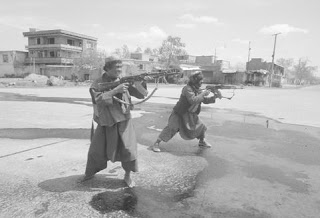Friends,
Let me cut to the chase. The biggest robbery in the history of this country is taking place as you read this. Though no guns are being used, 300 million hostages are being taken. Make no mistake about it: After stealing a half trillion dollars to line the pockets of their war-profiteering backers for the past five years, after lining the pockets of their fellow oilmen to the tune of over a hundred billion dollars in just the last two years, Bush and his cronies -- who must soon vacate the White House -- are looting the U.S. Treasury of every dollar they can grab. They are swiping as much of the silverware as they can on their way out the door.
No matter what they say, no matter how many scare words they use, they are up to their old tricks of creating fear and confusion in order to make and keep themselves and the upper one percent filthy rich. Just read the first four paragraphs of the lead story in last Monday's New York Times and you can see what the real deal is:"Even as policy makers worked on details of a $700 billion bailout of the financial industry, Wall Street began looking for ways to profit from it.
"Financial firms were lobbying to have all manner of troubled investments covered, not just those related to mortgages.
"At the same time, investment firms were jockeying to oversee all the assets that Treasury plans to take off the books of financial institutions, a role that could earn them hundreds of millions of dollars a year in fees.
"Nobody wants to be left out of Treasury's proposal to buy up bad assets of financial institutions."
Unbelievable. Wall Street and its backers created this mess and now they are going to clean up like bandits. Even Rudy Giuliani is lobbying for his firm to be hired (and paid) to "consult" in the bailout.
The problem is, nobody truly knows what this "collapse" is all about. Even Treasury Secretary Paulson admitted he doesn't know the exact amount that is needed (he just picked the $700 billion number out of his head!). The head of the congressional budget office said he can't figure it out nor can he explain it to anyone.
And yet, they are screeching about how the end is near! Panic! Recession! The Great Depression! Y2K! Bird flu! Killer bees! We must pass the bailout bill today!! The sky is falling! The sky is falling!
Falling for whom? NOTHING in this "bailout" package will lower the price of the gas you have to put in your car to get to work. NOTHING in this bill will protect you from losing your home. NOTHING in this bill will give you health insurance.
Health insurance? Mike, why are you bringing this up? What's this got to do with the Wall Street collapse?
It has everything to do with it. This so-called "collapse" was triggered by the massive defaulting and foreclosures going on with people's home mortgages. Do you know why so many Americans are losing their homes? To hear the Republicans describe it, it's because too many working class idiots were given mortgages that they really couldn't afford. Here's the truth: The number one cause of people declaring bankruptcy is because of medical bills. Let me state this simply: If we had had universal health coverage, this mortgage "crisis" may never have happened.
This bailout's mission is to protect the obscene amount of wealth that has been accumulated in the last eight years. It's to protect the top shareholders who own and control corporate America. It's to make sure their yachts and mansions and "way of life" go uninterrupted while the rest of America suffers and struggles to pay the bills. Let the rich suffer for once. Let them pay for the bailout. We are spending 400 million dollars a day on the war in Iraq. Let them end the war immediately and save us all another half-trillion dollars!
I have to stop writing this and you have to stop reading it. They are staging a financial coup this morning in our country. They are hoping Congress will act fast before they stop to think, before we have a chance to stop them ourselves. So stop reading this and do something -- NOW! Here's what you can do immediately:
1. Call or e-mail Senator Obama. Tell him he does not need to be sitting there trying to help prop up Bush and Cheney and the mess they've made. Tell him we know he has the smarts to slow this thing down and figure out what's the best route to take. Tell him the rich have to pay for whatever help is offered. Use the leverage we have now to insist on a moratorium on home foreclosures, to insist on a move to universal health coverage, and tell him that we the people need to be in charge of the economic decisions that affect our lives, not the barons of Wall Street.
2. Take to the streets. Participate in one of the hundreds of quickly-called demonstrations that are taking place all over the country (especially those near Wall Street and DC).
3. Call your Representative in Congress and your Senators. (click here to find their phone numbers). Tell them what you told Senator Obama.
When you screw up in life, there is hell to pay. Each and every one of you reading this knows that basic lesson and has paid the consequences of your actions at some point. In this great democracy, we cannot let there be one set of rules for the vast majority of hard-working citizens, and another set of rules for the elite, who, when they screw up, are handed one more gift on a silver platter. No more! Not again!
Yours, Michael Moore






.jpg)







